HGE401: Improving Hotel Guest Experience Through Technology Analysis
VerifiedAdded on 2023/06/11
|13
|3177
|388
Report
AI Summary
This report explores the significant role of technology in the hotel and hospitality industry, focusing on how it enhances the guest journey cycle. It examines the technologies used in each stage, including pre-arrival (online reservation systems, mobile apps), arrival (digital keys, self-check-in), occupancy (in-room technology, IoT devices), and departure (digital check-out). The report highlights the importance of technology in meeting the expectations of tech-savvy guests and maintaining a competitive edge. Recommendations are provided for further technology integration, such as self-check-in kiosks, chatbots for personalized service, and NFC technologies for customized experiences. The ultimate goal is to improve customer satisfaction and loyalty by aligning technological advancements with guest expectations. Desklib provides access to similar solved assignments and resources for students.
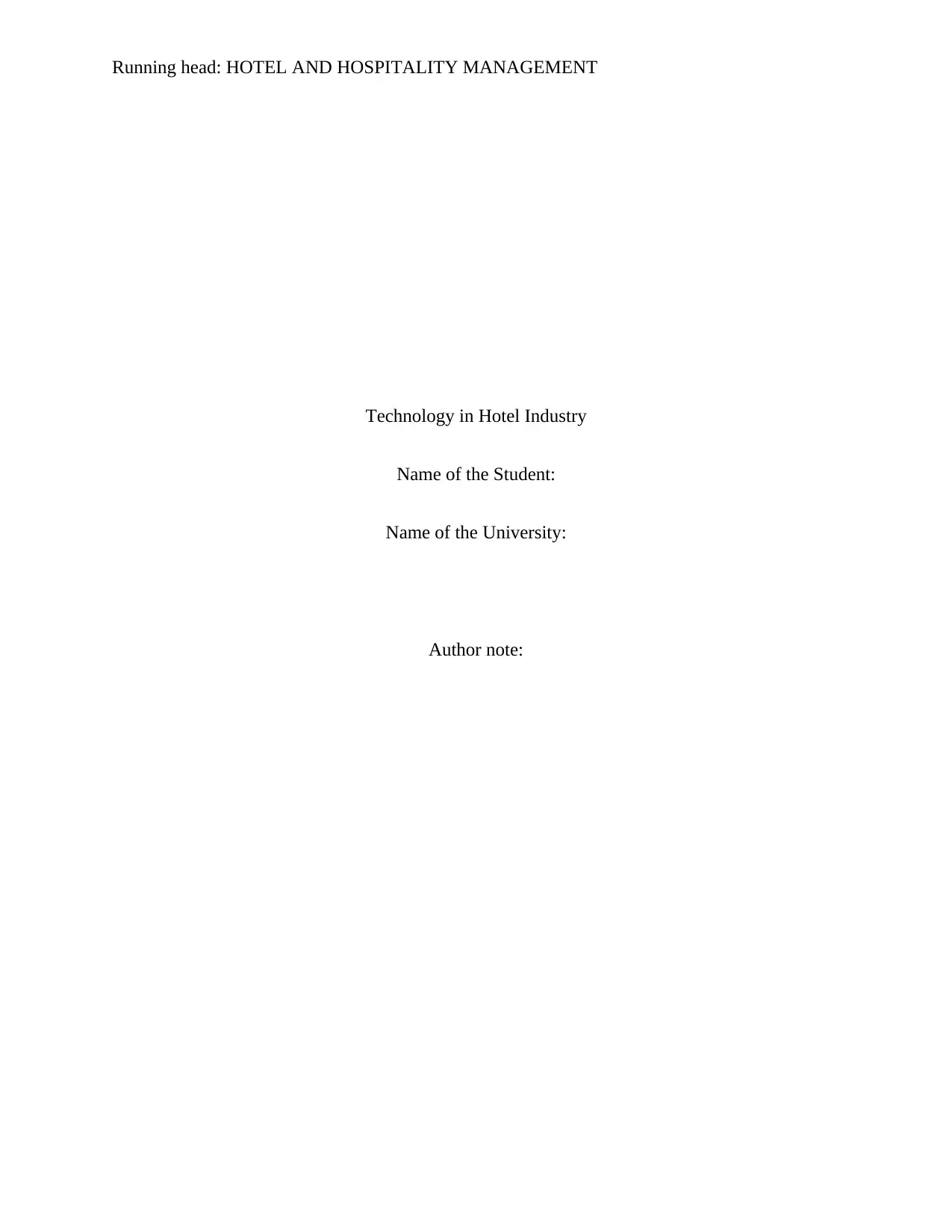
Running head: HOTEL AND HOSPITALITY MANAGEMENT
Technology in Hotel Industry
Name of the Student:
Name of the University:
Author note:
Technology in Hotel Industry
Name of the Student:
Name of the University:
Author note:
Paraphrase This Document
Need a fresh take? Get an instant paraphrase of this document with our AI Paraphraser
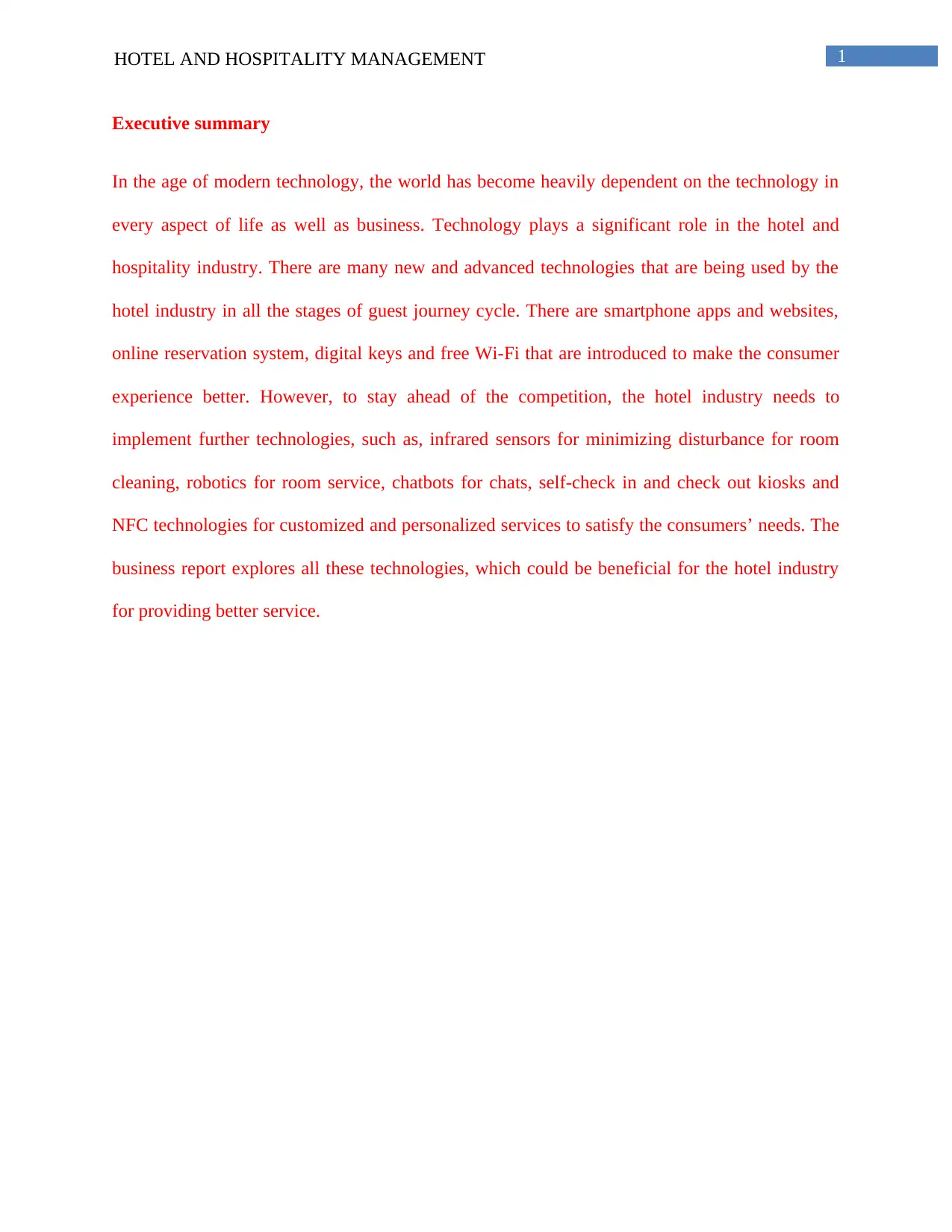
1HOTEL AND HOSPITALITY MANAGEMENT
Executive summary
In the age of modern technology, the world has become heavily dependent on the technology in
every aspect of life as well as business. Technology plays a significant role in the hotel and
hospitality industry. There are many new and advanced technologies that are being used by the
hotel industry in all the stages of guest journey cycle. There are smartphone apps and websites,
online reservation system, digital keys and free Wi-Fi that are introduced to make the consumer
experience better. However, to stay ahead of the competition, the hotel industry needs to
implement further technologies, such as, infrared sensors for minimizing disturbance for room
cleaning, robotics for room service, chatbots for chats, self-check in and check out kiosks and
NFC technologies for customized and personalized services to satisfy the consumers’ needs. The
business report explores all these technologies, which could be beneficial for the hotel industry
for providing better service.
Executive summary
In the age of modern technology, the world has become heavily dependent on the technology in
every aspect of life as well as business. Technology plays a significant role in the hotel and
hospitality industry. There are many new and advanced technologies that are being used by the
hotel industry in all the stages of guest journey cycle. There are smartphone apps and websites,
online reservation system, digital keys and free Wi-Fi that are introduced to make the consumer
experience better. However, to stay ahead of the competition, the hotel industry needs to
implement further technologies, such as, infrared sensors for minimizing disturbance for room
cleaning, robotics for room service, chatbots for chats, self-check in and check out kiosks and
NFC technologies for customized and personalized services to satisfy the consumers’ needs. The
business report explores all these technologies, which could be beneficial for the hotel industry
for providing better service.
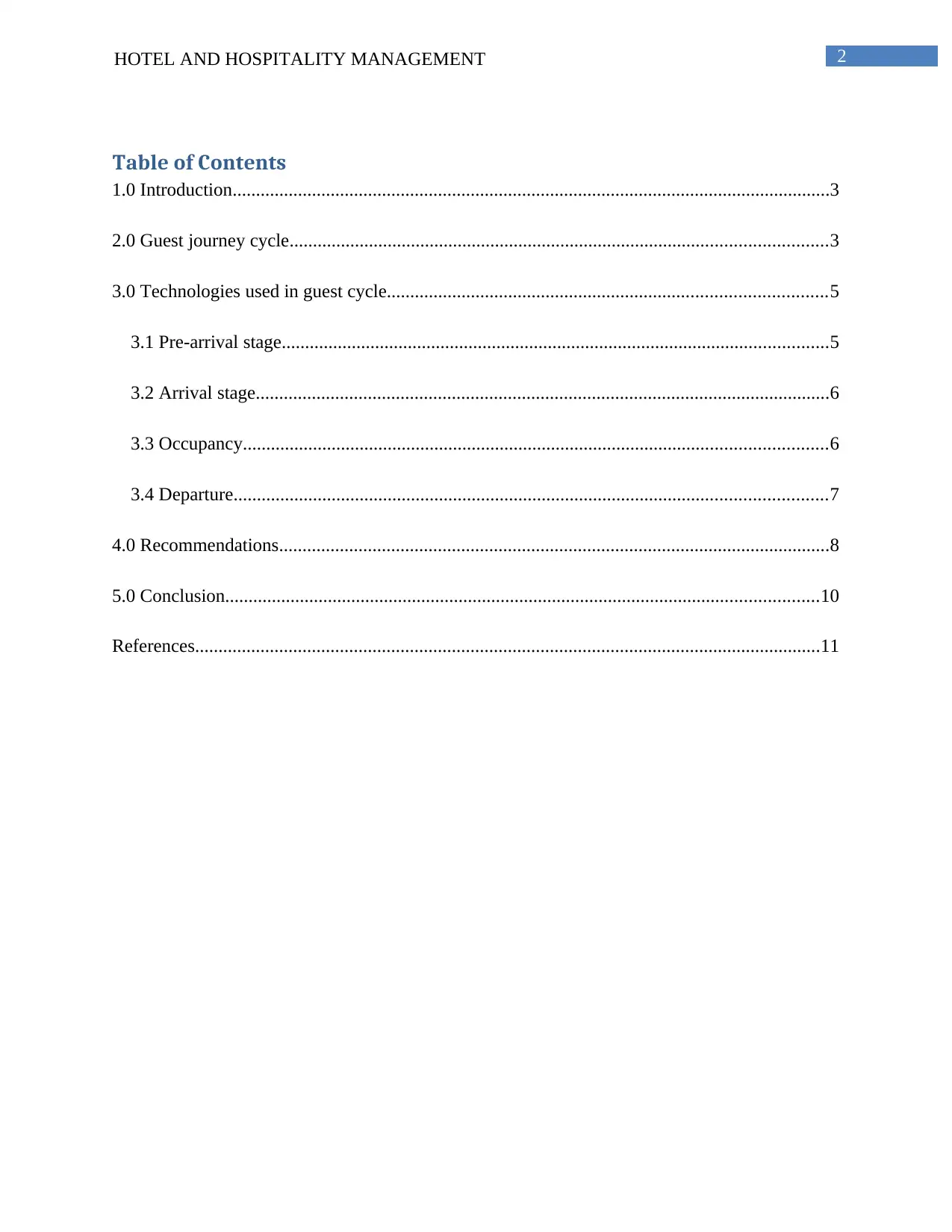
2HOTEL AND HOSPITALITY MANAGEMENT
Table of Contents
1.0 Introduction................................................................................................................................3
2.0 Guest journey cycle...................................................................................................................3
3.0 Technologies used in guest cycle..............................................................................................5
3.1 Pre-arrival stage.....................................................................................................................5
3.2 Arrival stage...........................................................................................................................6
3.3 Occupancy.............................................................................................................................6
3.4 Departure...............................................................................................................................7
4.0 Recommendations......................................................................................................................8
5.0 Conclusion...............................................................................................................................10
References......................................................................................................................................11
Table of Contents
1.0 Introduction................................................................................................................................3
2.0 Guest journey cycle...................................................................................................................3
3.0 Technologies used in guest cycle..............................................................................................5
3.1 Pre-arrival stage.....................................................................................................................5
3.2 Arrival stage...........................................................................................................................6
3.3 Occupancy.............................................................................................................................6
3.4 Departure...............................................................................................................................7
4.0 Recommendations......................................................................................................................8
5.0 Conclusion...............................................................................................................................10
References......................................................................................................................................11
⊘ This is a preview!⊘
Do you want full access?
Subscribe today to unlock all pages.

Trusted by 1+ million students worldwide
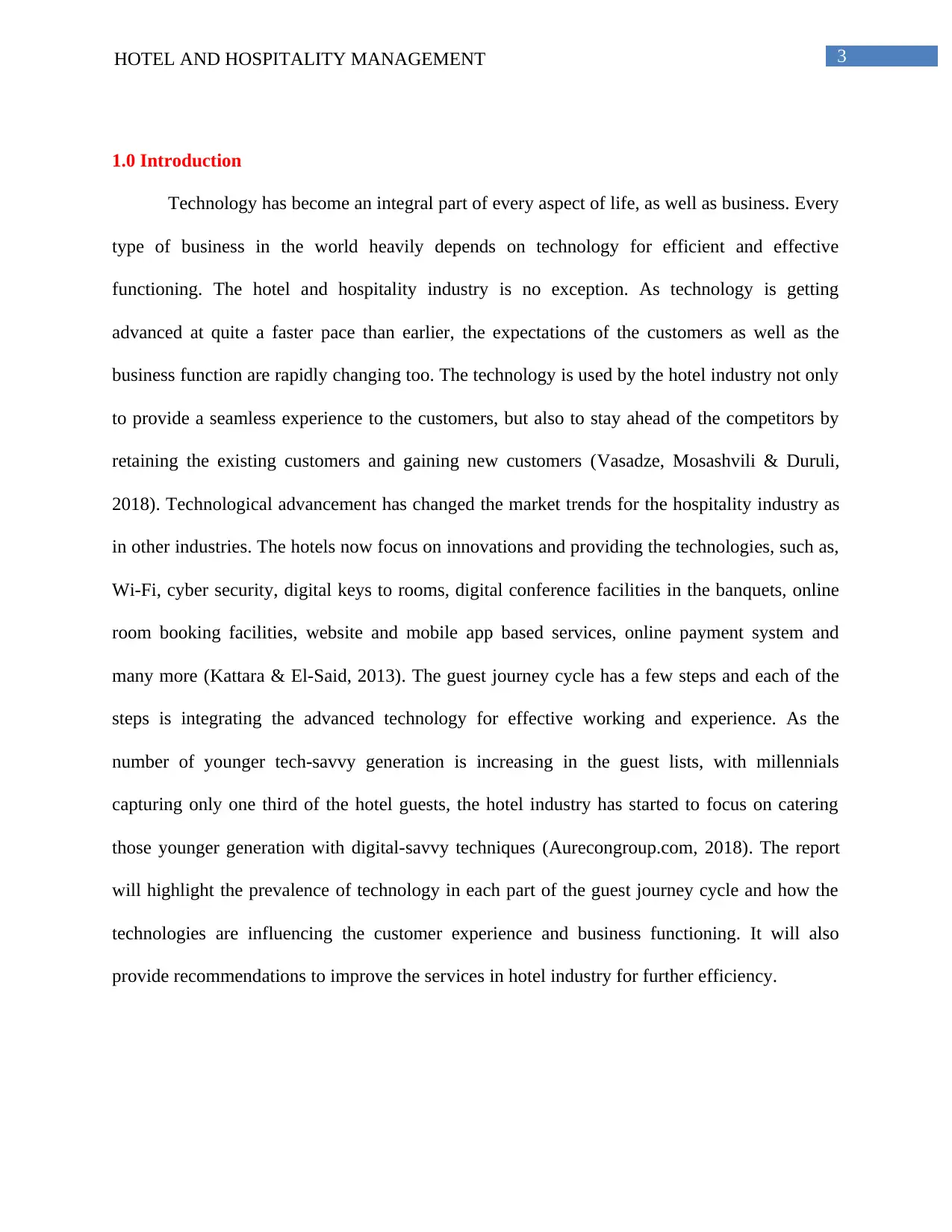
3HOTEL AND HOSPITALITY MANAGEMENT
1.0 Introduction
Technology has become an integral part of every aspect of life, as well as business. Every
type of business in the world heavily depends on technology for efficient and effective
functioning. The hotel and hospitality industry is no exception. As technology is getting
advanced at quite a faster pace than earlier, the expectations of the customers as well as the
business function are rapidly changing too. The technology is used by the hotel industry not only
to provide a seamless experience to the customers, but also to stay ahead of the competitors by
retaining the existing customers and gaining new customers (Vasadze, Mosashvili & Duruli,
2018). Technological advancement has changed the market trends for the hospitality industry as
in other industries. The hotels now focus on innovations and providing the technologies, such as,
Wi-Fi, cyber security, digital keys to rooms, digital conference facilities in the banquets, online
room booking facilities, website and mobile app based services, online payment system and
many more (Kattara & El-Said, 2013). The guest journey cycle has a few steps and each of the
steps is integrating the advanced technology for effective working and experience. As the
number of younger tech-savvy generation is increasing in the guest lists, with millennials
capturing only one third of the hotel guests, the hotel industry has started to focus on catering
those younger generation with digital-savvy techniques (Aurecongroup.com, 2018). The report
will highlight the prevalence of technology in each part of the guest journey cycle and how the
technologies are influencing the customer experience and business functioning. It will also
provide recommendations to improve the services in hotel industry for further efficiency.
1.0 Introduction
Technology has become an integral part of every aspect of life, as well as business. Every
type of business in the world heavily depends on technology for efficient and effective
functioning. The hotel and hospitality industry is no exception. As technology is getting
advanced at quite a faster pace than earlier, the expectations of the customers as well as the
business function are rapidly changing too. The technology is used by the hotel industry not only
to provide a seamless experience to the customers, but also to stay ahead of the competitors by
retaining the existing customers and gaining new customers (Vasadze, Mosashvili & Duruli,
2018). Technological advancement has changed the market trends for the hospitality industry as
in other industries. The hotels now focus on innovations and providing the technologies, such as,
Wi-Fi, cyber security, digital keys to rooms, digital conference facilities in the banquets, online
room booking facilities, website and mobile app based services, online payment system and
many more (Kattara & El-Said, 2013). The guest journey cycle has a few steps and each of the
steps is integrating the advanced technology for effective working and experience. As the
number of younger tech-savvy generation is increasing in the guest lists, with millennials
capturing only one third of the hotel guests, the hotel industry has started to focus on catering
those younger generation with digital-savvy techniques (Aurecongroup.com, 2018). The report
will highlight the prevalence of technology in each part of the guest journey cycle and how the
technologies are influencing the customer experience and business functioning. It will also
provide recommendations to improve the services in hotel industry for further efficiency.
Paraphrase This Document
Need a fresh take? Get an instant paraphrase of this document with our AI Paraphraser
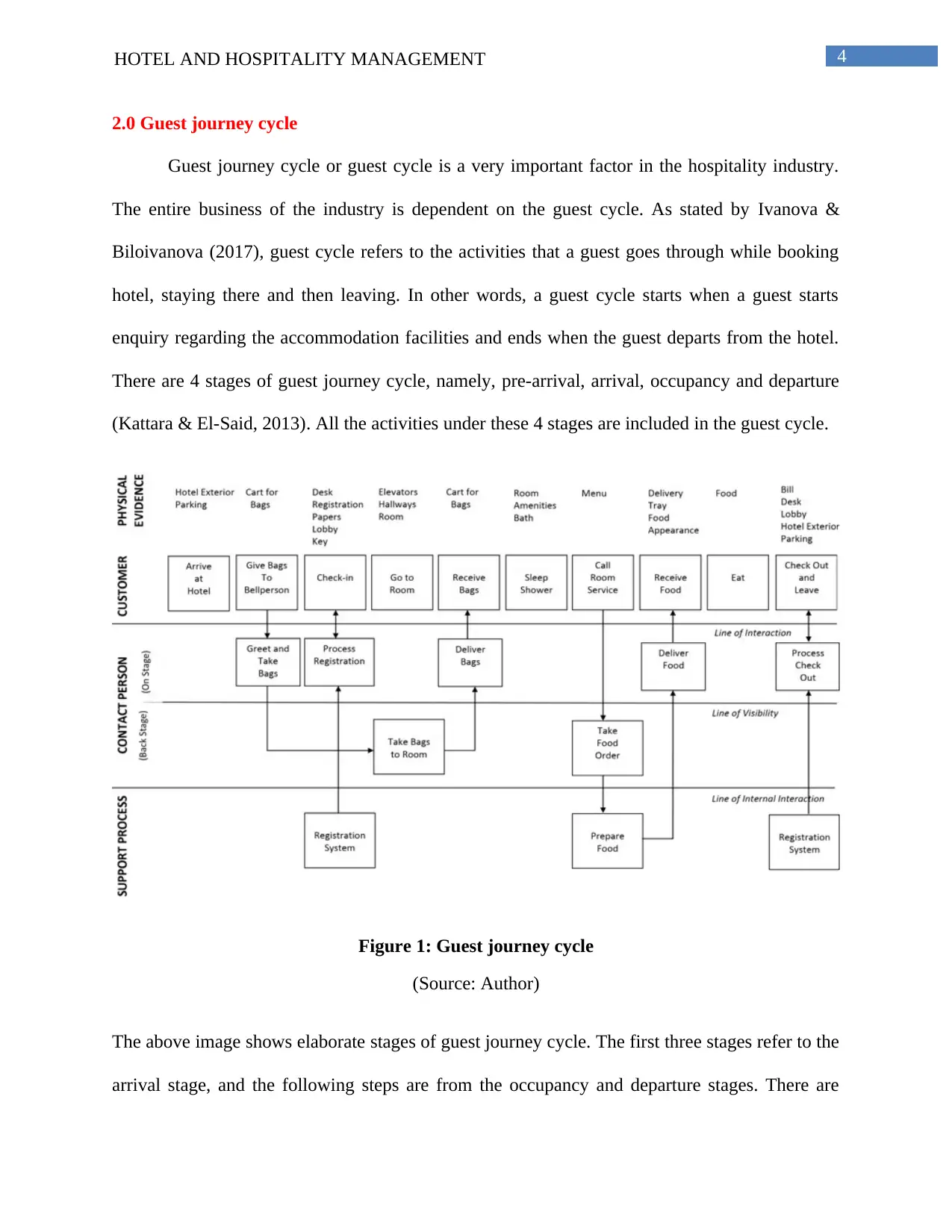
4HOTEL AND HOSPITALITY MANAGEMENT
2.0 Guest journey cycle
Guest journey cycle or guest cycle is a very important factor in the hospitality industry.
The entire business of the industry is dependent on the guest cycle. As stated by Ivanova &
Biloivanova (2017), guest cycle refers to the activities that a guest goes through while booking
hotel, staying there and then leaving. In other words, a guest cycle starts when a guest starts
enquiry regarding the accommodation facilities and ends when the guest departs from the hotel.
There are 4 stages of guest journey cycle, namely, pre-arrival, arrival, occupancy and departure
(Kattara & El-Said, 2013). All the activities under these 4 stages are included in the guest cycle.
Figure 1: Guest journey cycle
(Source: Author)
The above image shows elaborate stages of guest journey cycle. The first three stages refer to the
arrival stage, and the following steps are from the occupancy and departure stages. There are
2.0 Guest journey cycle
Guest journey cycle or guest cycle is a very important factor in the hospitality industry.
The entire business of the industry is dependent on the guest cycle. As stated by Ivanova &
Biloivanova (2017), guest cycle refers to the activities that a guest goes through while booking
hotel, staying there and then leaving. In other words, a guest cycle starts when a guest starts
enquiry regarding the accommodation facilities and ends when the guest departs from the hotel.
There are 4 stages of guest journey cycle, namely, pre-arrival, arrival, occupancy and departure
(Kattara & El-Said, 2013). All the activities under these 4 stages are included in the guest cycle.
Figure 1: Guest journey cycle
(Source: Author)
The above image shows elaborate stages of guest journey cycle. The first three stages refer to the
arrival stage, and the following steps are from the occupancy and departure stages. There are
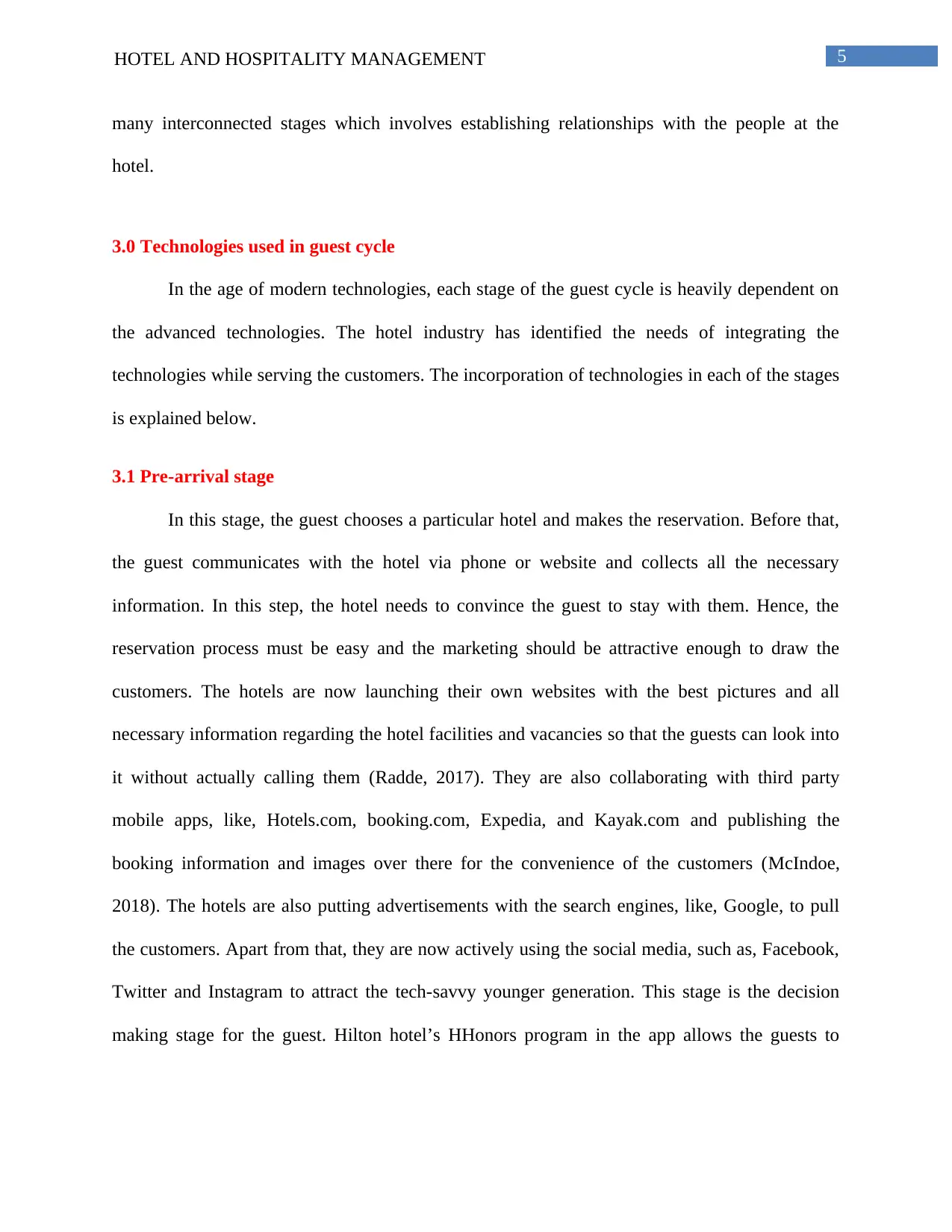
5HOTEL AND HOSPITALITY MANAGEMENT
many interconnected stages which involves establishing relationships with the people at the
hotel.
3.0 Technologies used in guest cycle
In the age of modern technologies, each stage of the guest cycle is heavily dependent on
the advanced technologies. The hotel industry has identified the needs of integrating the
technologies while serving the customers. The incorporation of technologies in each of the stages
is explained below.
3.1 Pre-arrival stage
In this stage, the guest chooses a particular hotel and makes the reservation. Before that,
the guest communicates with the hotel via phone or website and collects all the necessary
information. In this step, the hotel needs to convince the guest to stay with them. Hence, the
reservation process must be easy and the marketing should be attractive enough to draw the
customers. The hotels are now launching their own websites with the best pictures and all
necessary information regarding the hotel facilities and vacancies so that the guests can look into
it without actually calling them (Radde, 2017). They are also collaborating with third party
mobile apps, like, Hotels.com, booking.com, Expedia, and Kayak.com and publishing the
booking information and images over there for the convenience of the customers (McIndoe,
2018). The hotels are also putting advertisements with the search engines, like, Google, to pull
the customers. Apart from that, they are now actively using the social media, such as, Facebook,
Twitter and Instagram to attract the tech-savvy younger generation. This stage is the decision
making stage for the guest. Hilton hotel’s HHonors program in the app allows the guests to
many interconnected stages which involves establishing relationships with the people at the
hotel.
3.0 Technologies used in guest cycle
In the age of modern technologies, each stage of the guest cycle is heavily dependent on
the advanced technologies. The hotel industry has identified the needs of integrating the
technologies while serving the customers. The incorporation of technologies in each of the stages
is explained below.
3.1 Pre-arrival stage
In this stage, the guest chooses a particular hotel and makes the reservation. Before that,
the guest communicates with the hotel via phone or website and collects all the necessary
information. In this step, the hotel needs to convince the guest to stay with them. Hence, the
reservation process must be easy and the marketing should be attractive enough to draw the
customers. The hotels are now launching their own websites with the best pictures and all
necessary information regarding the hotel facilities and vacancies so that the guests can look into
it without actually calling them (Radde, 2017). They are also collaborating with third party
mobile apps, like, Hotels.com, booking.com, Expedia, and Kayak.com and publishing the
booking information and images over there for the convenience of the customers (McIndoe,
2018). The hotels are also putting advertisements with the search engines, like, Google, to pull
the customers. Apart from that, they are now actively using the social media, such as, Facebook,
Twitter and Instagram to attract the tech-savvy younger generation. This stage is the decision
making stage for the guest. Hilton hotel’s HHonors program in the app allows the guests to
⊘ This is a preview!⊘
Do you want full access?
Subscribe today to unlock all pages.

Trusted by 1+ million students worldwide
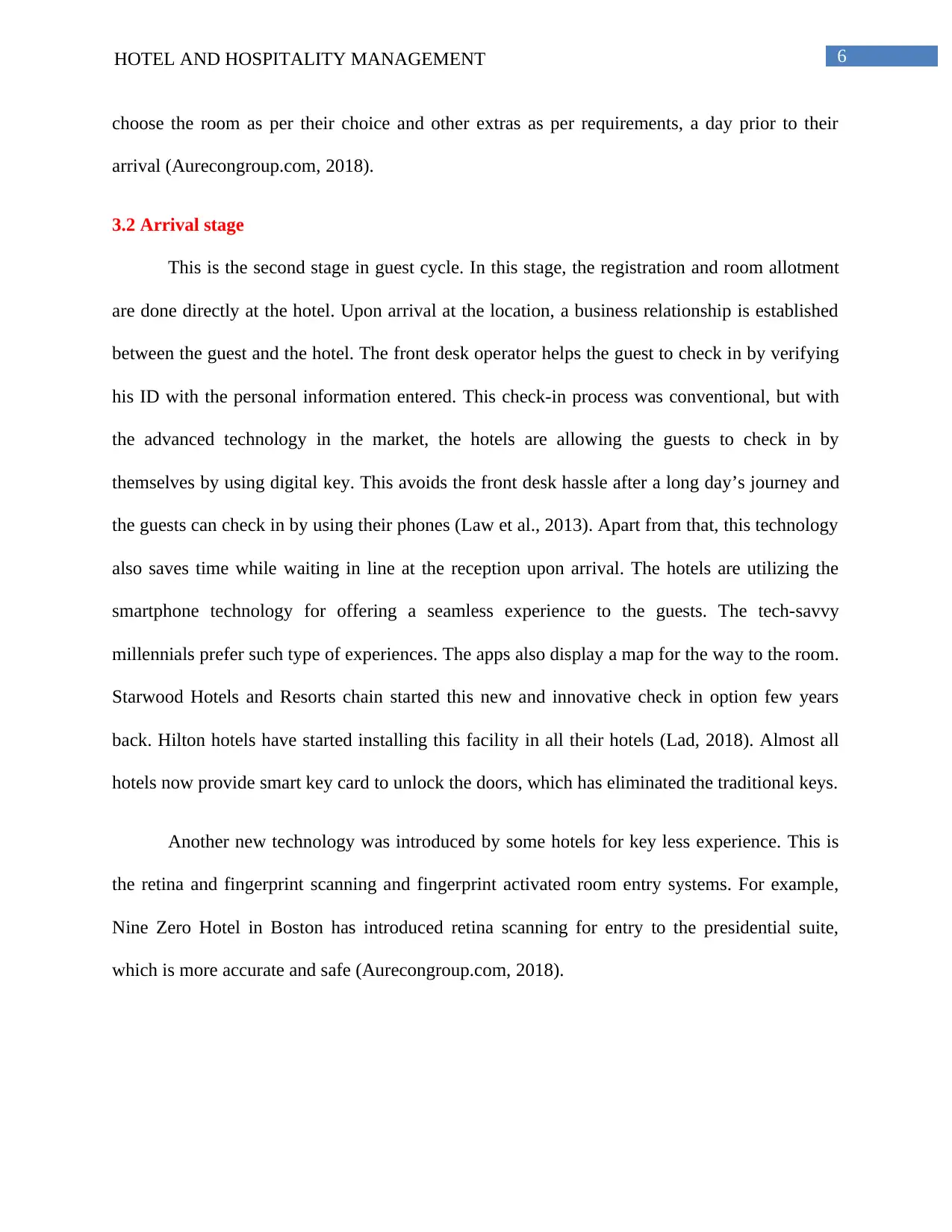
6HOTEL AND HOSPITALITY MANAGEMENT
choose the room as per their choice and other extras as per requirements, a day prior to their
arrival (Aurecongroup.com, 2018).
3.2 Arrival stage
This is the second stage in guest cycle. In this stage, the registration and room allotment
are done directly at the hotel. Upon arrival at the location, a business relationship is established
between the guest and the hotel. The front desk operator helps the guest to check in by verifying
his ID with the personal information entered. This check-in process was conventional, but with
the advanced technology in the market, the hotels are allowing the guests to check in by
themselves by using digital key. This avoids the front desk hassle after a long day’s journey and
the guests can check in by using their phones (Law et al., 2013). Apart from that, this technology
also saves time while waiting in line at the reception upon arrival. The hotels are utilizing the
smartphone technology for offering a seamless experience to the guests. The tech-savvy
millennials prefer such type of experiences. The apps also display a map for the way to the room.
Starwood Hotels and Resorts chain started this new and innovative check in option few years
back. Hilton hotels have started installing this facility in all their hotels (Lad, 2018). Almost all
hotels now provide smart key card to unlock the doors, which has eliminated the traditional keys.
Another new technology was introduced by some hotels for key less experience. This is
the retina and fingerprint scanning and fingerprint activated room entry systems. For example,
Nine Zero Hotel in Boston has introduced retina scanning for entry to the presidential suite,
which is more accurate and safe (Aurecongroup.com, 2018).
choose the room as per their choice and other extras as per requirements, a day prior to their
arrival (Aurecongroup.com, 2018).
3.2 Arrival stage
This is the second stage in guest cycle. In this stage, the registration and room allotment
are done directly at the hotel. Upon arrival at the location, a business relationship is established
between the guest and the hotel. The front desk operator helps the guest to check in by verifying
his ID with the personal information entered. This check-in process was conventional, but with
the advanced technology in the market, the hotels are allowing the guests to check in by
themselves by using digital key. This avoids the front desk hassle after a long day’s journey and
the guests can check in by using their phones (Law et al., 2013). Apart from that, this technology
also saves time while waiting in line at the reception upon arrival. The hotels are utilizing the
smartphone technology for offering a seamless experience to the guests. The tech-savvy
millennials prefer such type of experiences. The apps also display a map for the way to the room.
Starwood Hotels and Resorts chain started this new and innovative check in option few years
back. Hilton hotels have started installing this facility in all their hotels (Lad, 2018). Almost all
hotels now provide smart key card to unlock the doors, which has eliminated the traditional keys.
Another new technology was introduced by some hotels for key less experience. This is
the retina and fingerprint scanning and fingerprint activated room entry systems. For example,
Nine Zero Hotel in Boston has introduced retina scanning for entry to the presidential suite,
which is more accurate and safe (Aurecongroup.com, 2018).
Paraphrase This Document
Need a fresh take? Get an instant paraphrase of this document with our AI Paraphraser
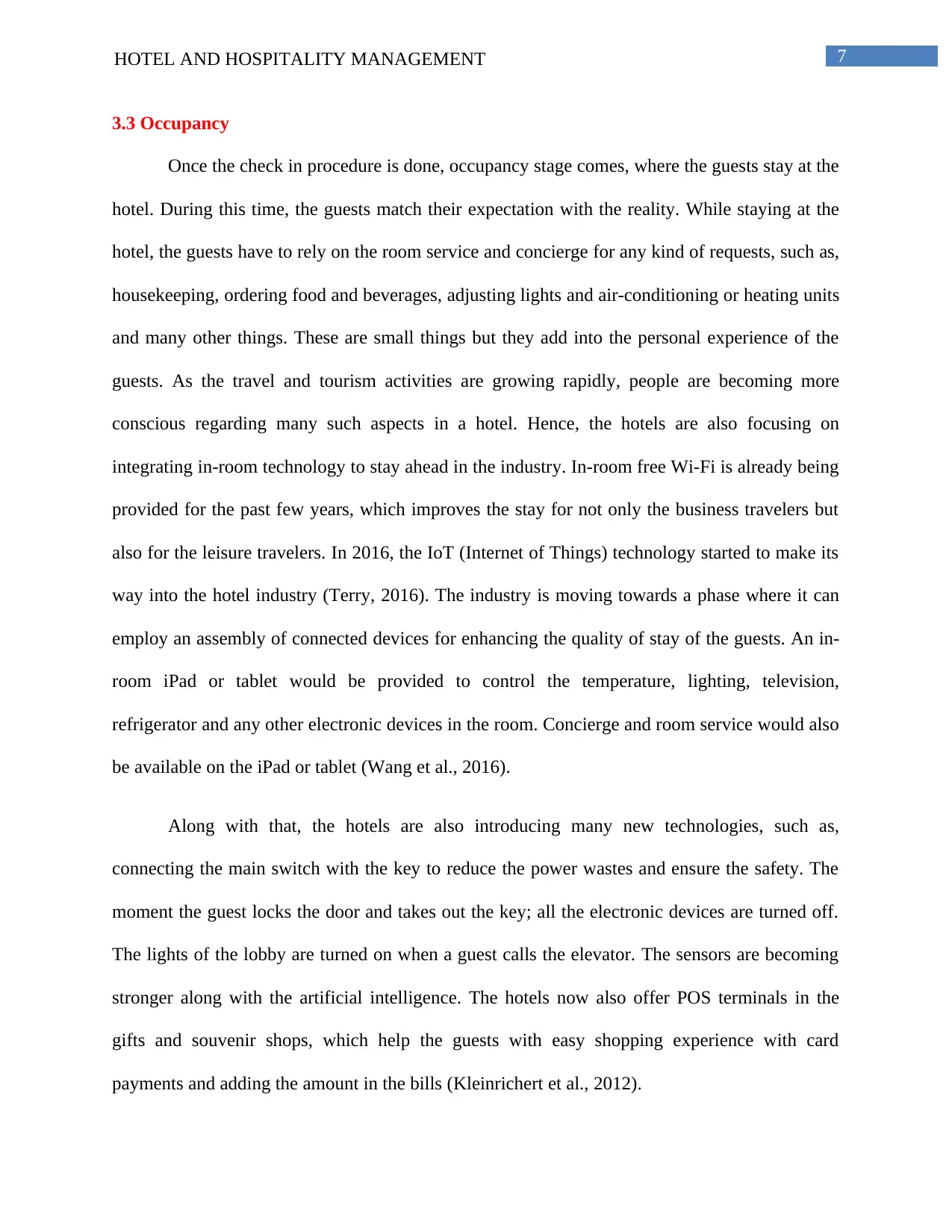
7HOTEL AND HOSPITALITY MANAGEMENT
3.3 Occupancy
Once the check in procedure is done, occupancy stage comes, where the guests stay at the
hotel. During this time, the guests match their expectation with the reality. While staying at the
hotel, the guests have to rely on the room service and concierge for any kind of requests, such as,
housekeeping, ordering food and beverages, adjusting lights and air-conditioning or heating units
and many other things. These are small things but they add into the personal experience of the
guests. As the travel and tourism activities are growing rapidly, people are becoming more
conscious regarding many such aspects in a hotel. Hence, the hotels are also focusing on
integrating in-room technology to stay ahead in the industry. In-room free Wi-Fi is already being
provided for the past few years, which improves the stay for not only the business travelers but
also for the leisure travelers. In 2016, the IoT (Internet of Things) technology started to make its
way into the hotel industry (Terry, 2016). The industry is moving towards a phase where it can
employ an assembly of connected devices for enhancing the quality of stay of the guests. An in-
room iPad or tablet would be provided to control the temperature, lighting, television,
refrigerator and any other electronic devices in the room. Concierge and room service would also
be available on the iPad or tablet (Wang et al., 2016).
Along with that, the hotels are also introducing many new technologies, such as,
connecting the main switch with the key to reduce the power wastes and ensure the safety. The
moment the guest locks the door and takes out the key; all the electronic devices are turned off.
The lights of the lobby are turned on when a guest calls the elevator. The sensors are becoming
stronger along with the artificial intelligence. The hotels now also offer POS terminals in the
gifts and souvenir shops, which help the guests with easy shopping experience with card
payments and adding the amount in the bills (Kleinrichert et al., 2012).
3.3 Occupancy
Once the check in procedure is done, occupancy stage comes, where the guests stay at the
hotel. During this time, the guests match their expectation with the reality. While staying at the
hotel, the guests have to rely on the room service and concierge for any kind of requests, such as,
housekeeping, ordering food and beverages, adjusting lights and air-conditioning or heating units
and many other things. These are small things but they add into the personal experience of the
guests. As the travel and tourism activities are growing rapidly, people are becoming more
conscious regarding many such aspects in a hotel. Hence, the hotels are also focusing on
integrating in-room technology to stay ahead in the industry. In-room free Wi-Fi is already being
provided for the past few years, which improves the stay for not only the business travelers but
also for the leisure travelers. In 2016, the IoT (Internet of Things) technology started to make its
way into the hotel industry (Terry, 2016). The industry is moving towards a phase where it can
employ an assembly of connected devices for enhancing the quality of stay of the guests. An in-
room iPad or tablet would be provided to control the temperature, lighting, television,
refrigerator and any other electronic devices in the room. Concierge and room service would also
be available on the iPad or tablet (Wang et al., 2016).
Along with that, the hotels are also introducing many new technologies, such as,
connecting the main switch with the key to reduce the power wastes and ensure the safety. The
moment the guest locks the door and takes out the key; all the electronic devices are turned off.
The lights of the lobby are turned on when a guest calls the elevator. The sensors are becoming
stronger along with the artificial intelligence. The hotels now also offer POS terminals in the
gifts and souvenir shops, which help the guests with easy shopping experience with card
payments and adding the amount in the bills (Kleinrichert et al., 2012).
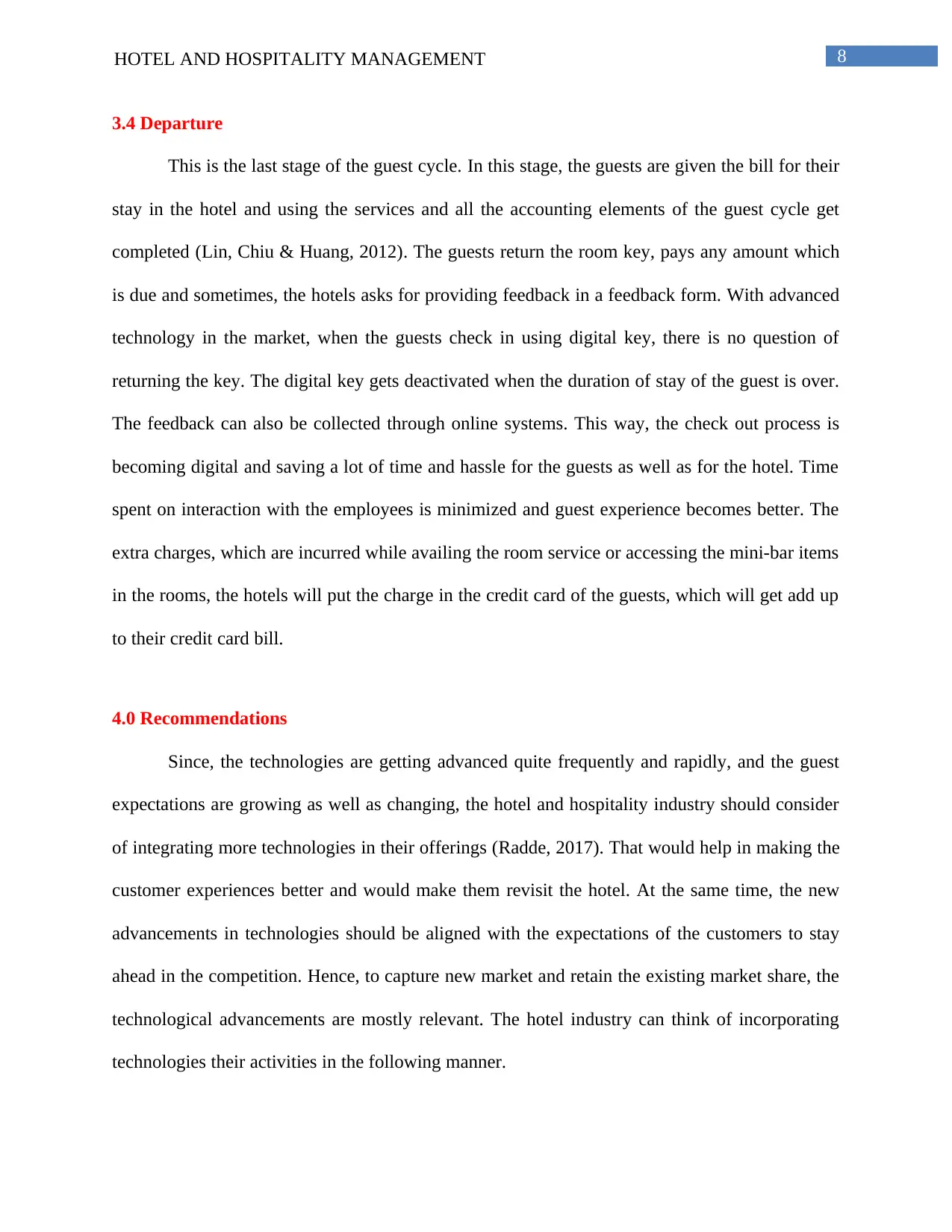
8HOTEL AND HOSPITALITY MANAGEMENT
3.4 Departure
This is the last stage of the guest cycle. In this stage, the guests are given the bill for their
stay in the hotel and using the services and all the accounting elements of the guest cycle get
completed (Lin, Chiu & Huang, 2012). The guests return the room key, pays any amount which
is due and sometimes, the hotels asks for providing feedback in a feedback form. With advanced
technology in the market, when the guests check in using digital key, there is no question of
returning the key. The digital key gets deactivated when the duration of stay of the guest is over.
The feedback can also be collected through online systems. This way, the check out process is
becoming digital and saving a lot of time and hassle for the guests as well as for the hotel. Time
spent on interaction with the employees is minimized and guest experience becomes better. The
extra charges, which are incurred while availing the room service or accessing the mini-bar items
in the rooms, the hotels will put the charge in the credit card of the guests, which will get add up
to their credit card bill.
4.0 Recommendations
Since, the technologies are getting advanced quite frequently and rapidly, and the guest
expectations are growing as well as changing, the hotel and hospitality industry should consider
of integrating more technologies in their offerings (Radde, 2017). That would help in making the
customer experiences better and would make them revisit the hotel. At the same time, the new
advancements in technologies should be aligned with the expectations of the customers to stay
ahead in the competition. Hence, to capture new market and retain the existing market share, the
technological advancements are mostly relevant. The hotel industry can think of incorporating
technologies their activities in the following manner.
3.4 Departure
This is the last stage of the guest cycle. In this stage, the guests are given the bill for their
stay in the hotel and using the services and all the accounting elements of the guest cycle get
completed (Lin, Chiu & Huang, 2012). The guests return the room key, pays any amount which
is due and sometimes, the hotels asks for providing feedback in a feedback form. With advanced
technology in the market, when the guests check in using digital key, there is no question of
returning the key. The digital key gets deactivated when the duration of stay of the guest is over.
The feedback can also be collected through online systems. This way, the check out process is
becoming digital and saving a lot of time and hassle for the guests as well as for the hotel. Time
spent on interaction with the employees is minimized and guest experience becomes better. The
extra charges, which are incurred while availing the room service or accessing the mini-bar items
in the rooms, the hotels will put the charge in the credit card of the guests, which will get add up
to their credit card bill.
4.0 Recommendations
Since, the technologies are getting advanced quite frequently and rapidly, and the guest
expectations are growing as well as changing, the hotel and hospitality industry should consider
of integrating more technologies in their offerings (Radde, 2017). That would help in making the
customer experiences better and would make them revisit the hotel. At the same time, the new
advancements in technologies should be aligned with the expectations of the customers to stay
ahead in the competition. Hence, to capture new market and retain the existing market share, the
technological advancements are mostly relevant. The hotel industry can think of incorporating
technologies their activities in the following manner.
⊘ This is a preview!⊘
Do you want full access?
Subscribe today to unlock all pages.

Trusted by 1+ million students worldwide
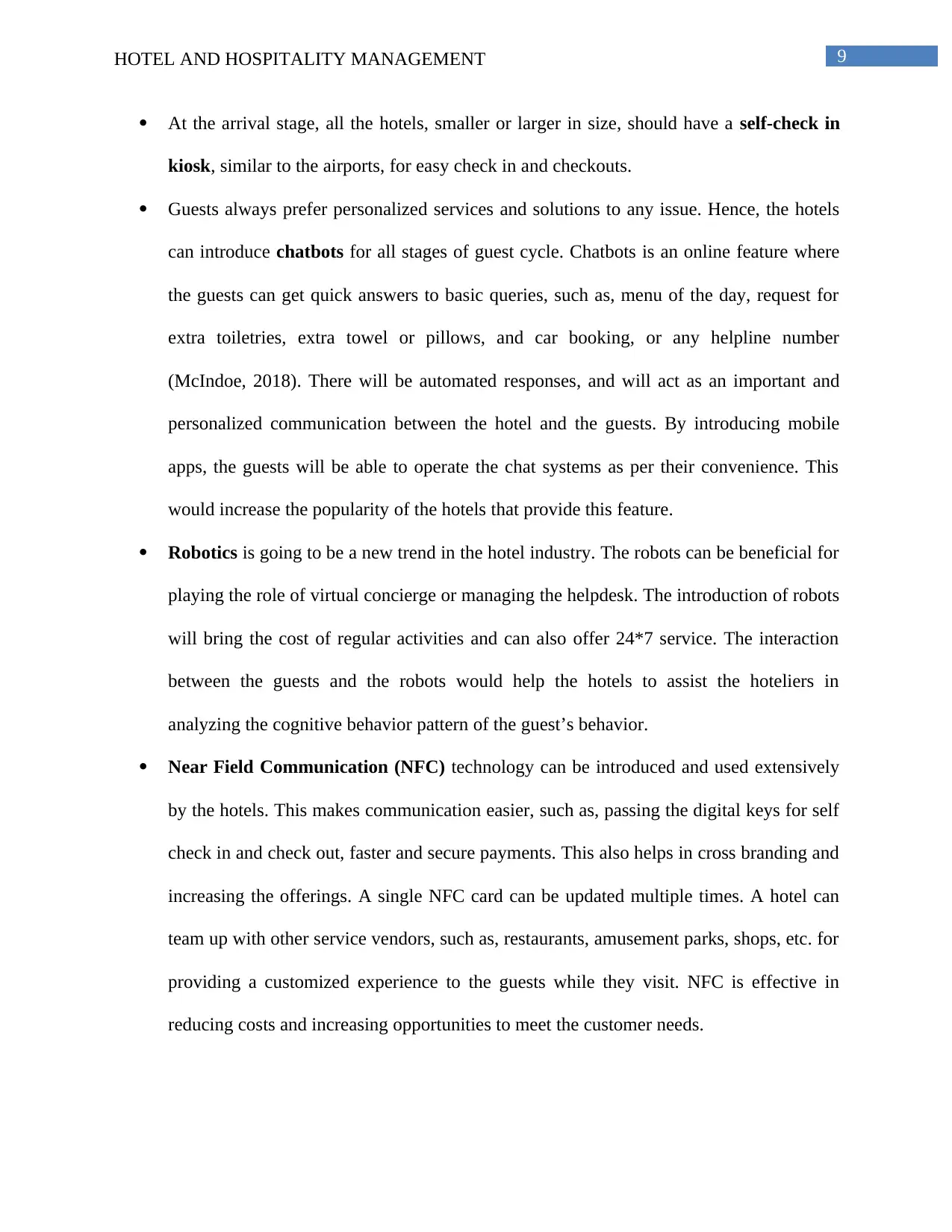
9HOTEL AND HOSPITALITY MANAGEMENT
At the arrival stage, all the hotels, smaller or larger in size, should have a self-check in
kiosk, similar to the airports, for easy check in and checkouts.
Guests always prefer personalized services and solutions to any issue. Hence, the hotels
can introduce chatbots for all stages of guest cycle. Chatbots is an online feature where
the guests can get quick answers to basic queries, such as, menu of the day, request for
extra toiletries, extra towel or pillows, and car booking, or any helpline number
(McIndoe, 2018). There will be automated responses, and will act as an important and
personalized communication between the hotel and the guests. By introducing mobile
apps, the guests will be able to operate the chat systems as per their convenience. This
would increase the popularity of the hotels that provide this feature.
Robotics is going to be a new trend in the hotel industry. The robots can be beneficial for
playing the role of virtual concierge or managing the helpdesk. The introduction of robots
will bring the cost of regular activities and can also offer 24*7 service. The interaction
between the guests and the robots would help the hotels to assist the hoteliers in
analyzing the cognitive behavior pattern of the guest’s behavior.
Near Field Communication (NFC) technology can be introduced and used extensively
by the hotels. This makes communication easier, such as, passing the digital keys for self
check in and check out, faster and secure payments. This also helps in cross branding and
increasing the offerings. A single NFC card can be updated multiple times. A hotel can
team up with other service vendors, such as, restaurants, amusement parks, shops, etc. for
providing a customized experience to the guests while they visit. NFC is effective in
reducing costs and increasing opportunities to meet the customer needs.
At the arrival stage, all the hotels, smaller or larger in size, should have a self-check in
kiosk, similar to the airports, for easy check in and checkouts.
Guests always prefer personalized services and solutions to any issue. Hence, the hotels
can introduce chatbots for all stages of guest cycle. Chatbots is an online feature where
the guests can get quick answers to basic queries, such as, menu of the day, request for
extra toiletries, extra towel or pillows, and car booking, or any helpline number
(McIndoe, 2018). There will be automated responses, and will act as an important and
personalized communication between the hotel and the guests. By introducing mobile
apps, the guests will be able to operate the chat systems as per their convenience. This
would increase the popularity of the hotels that provide this feature.
Robotics is going to be a new trend in the hotel industry. The robots can be beneficial for
playing the role of virtual concierge or managing the helpdesk. The introduction of robots
will bring the cost of regular activities and can also offer 24*7 service. The interaction
between the guests and the robots would help the hotels to assist the hoteliers in
analyzing the cognitive behavior pattern of the guest’s behavior.
Near Field Communication (NFC) technology can be introduced and used extensively
by the hotels. This makes communication easier, such as, passing the digital keys for self
check in and check out, faster and secure payments. This also helps in cross branding and
increasing the offerings. A single NFC card can be updated multiple times. A hotel can
team up with other service vendors, such as, restaurants, amusement parks, shops, etc. for
providing a customized experience to the guests while they visit. NFC is effective in
reducing costs and increasing opportunities to meet the customer needs.
Paraphrase This Document
Need a fresh take? Get an instant paraphrase of this document with our AI Paraphraser
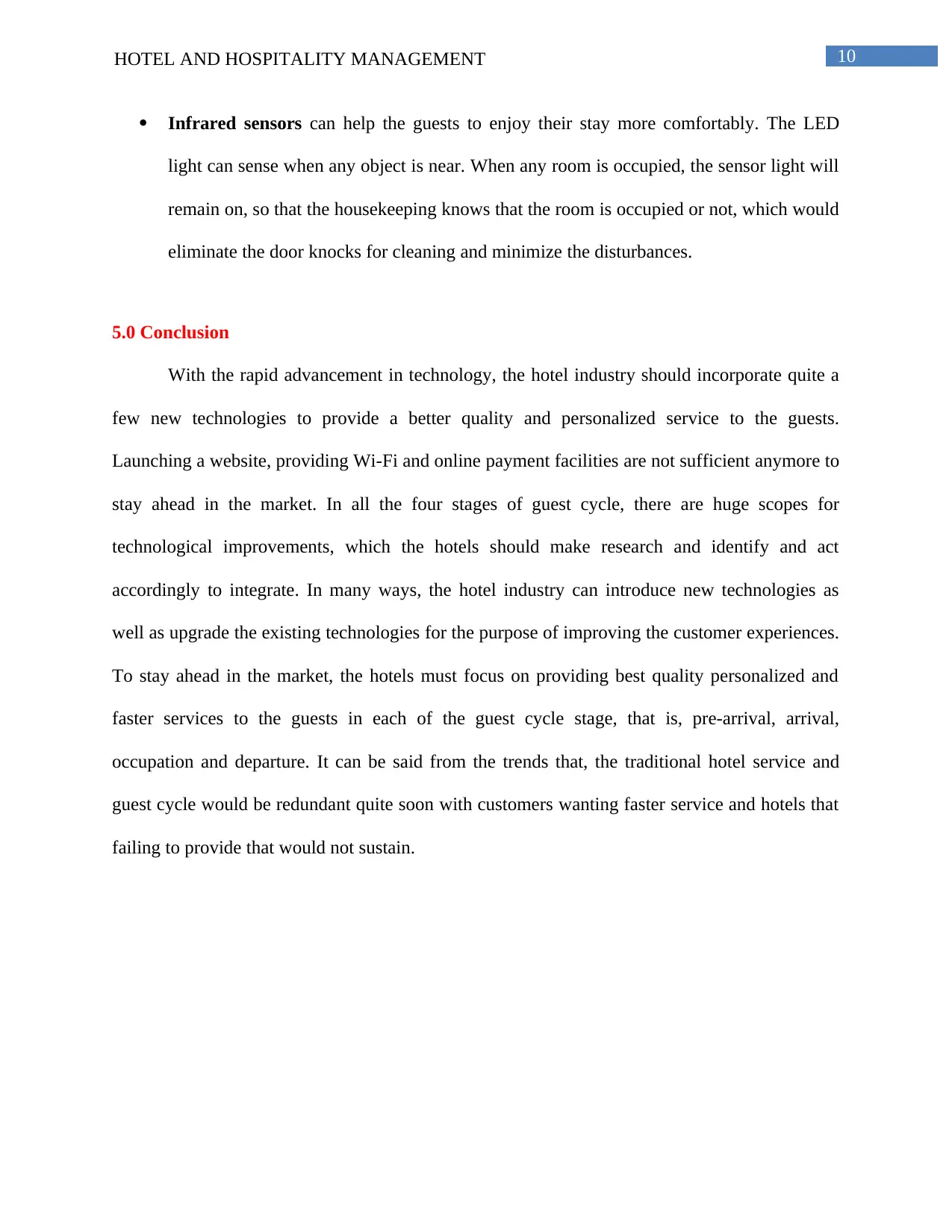
10HOTEL AND HOSPITALITY MANAGEMENT
Infrared sensors can help the guests to enjoy their stay more comfortably. The LED
light can sense when any object is near. When any room is occupied, the sensor light will
remain on, so that the housekeeping knows that the room is occupied or not, which would
eliminate the door knocks for cleaning and minimize the disturbances.
5.0 Conclusion
With the rapid advancement in technology, the hotel industry should incorporate quite a
few new technologies to provide a better quality and personalized service to the guests.
Launching a website, providing Wi-Fi and online payment facilities are not sufficient anymore to
stay ahead in the market. In all the four stages of guest cycle, there are huge scopes for
technological improvements, which the hotels should make research and identify and act
accordingly to integrate. In many ways, the hotel industry can introduce new technologies as
well as upgrade the existing technologies for the purpose of improving the customer experiences.
To stay ahead in the market, the hotels must focus on providing best quality personalized and
faster services to the guests in each of the guest cycle stage, that is, pre-arrival, arrival,
occupation and departure. It can be said from the trends that, the traditional hotel service and
guest cycle would be redundant quite soon with customers wanting faster service and hotels that
failing to provide that would not sustain.
Infrared sensors can help the guests to enjoy their stay more comfortably. The LED
light can sense when any object is near. When any room is occupied, the sensor light will
remain on, so that the housekeeping knows that the room is occupied or not, which would
eliminate the door knocks for cleaning and minimize the disturbances.
5.0 Conclusion
With the rapid advancement in technology, the hotel industry should incorporate quite a
few new technologies to provide a better quality and personalized service to the guests.
Launching a website, providing Wi-Fi and online payment facilities are not sufficient anymore to
stay ahead in the market. In all the four stages of guest cycle, there are huge scopes for
technological improvements, which the hotels should make research and identify and act
accordingly to integrate. In many ways, the hotel industry can introduce new technologies as
well as upgrade the existing technologies for the purpose of improving the customer experiences.
To stay ahead in the market, the hotels must focus on providing best quality personalized and
faster services to the guests in each of the guest cycle stage, that is, pre-arrival, arrival,
occupation and departure. It can be said from the trends that, the traditional hotel service and
guest cycle would be redundant quite soon with customers wanting faster service and hotels that
failing to provide that would not sustain.
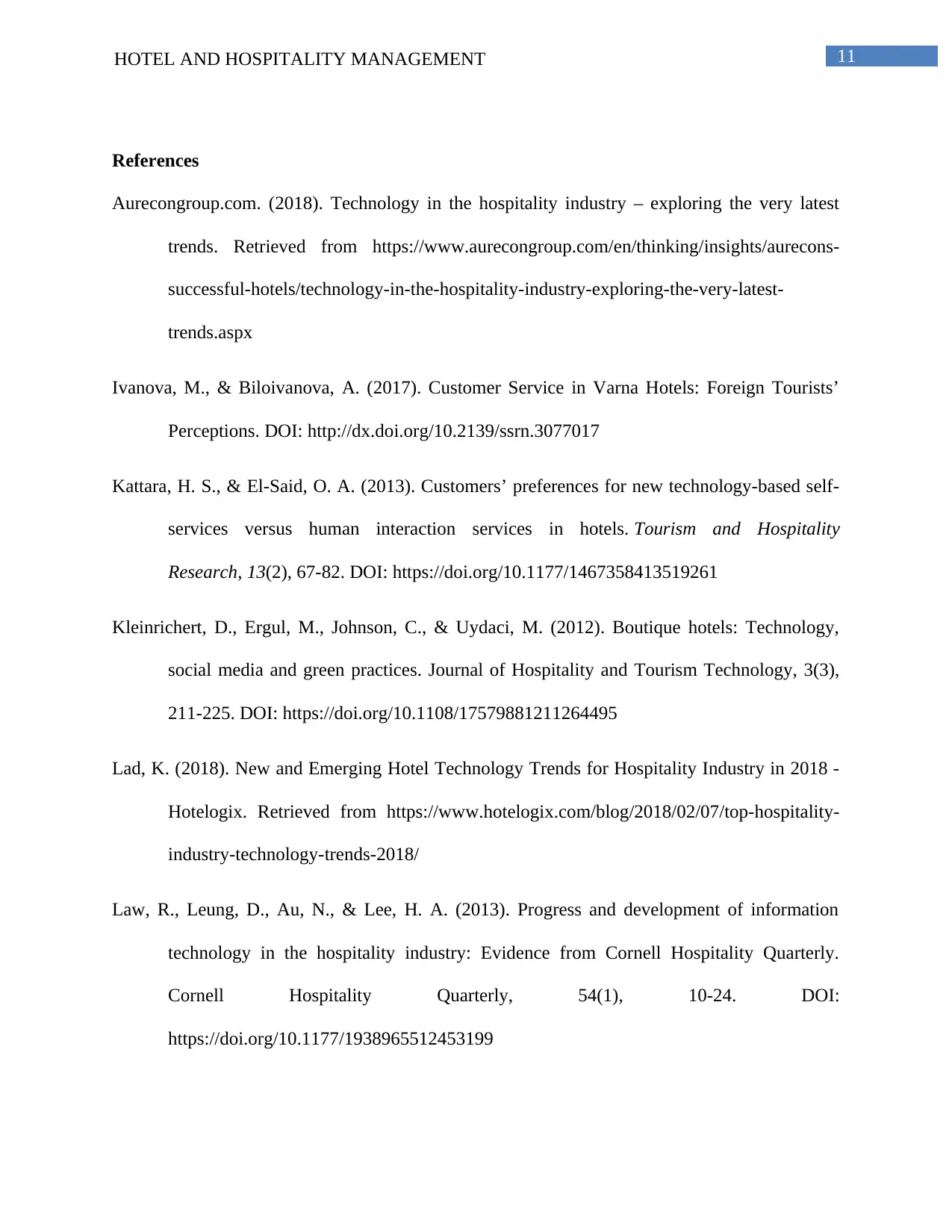
11HOTEL AND HOSPITALITY MANAGEMENT
References
Aurecongroup.com. (2018). Technology in the hospitality industry – exploring the very latest
trends. Retrieved from https://www.aurecongroup.com/en/thinking/insights/aurecons-
successful-hotels/technology-in-the-hospitality-industry-exploring-the-very-latest-
trends.aspx
Ivanova, M., & Biloivanova, A. (2017). Customer Service in Varna Hotels: Foreign Tourists’
Perceptions. DOI: http://dx.doi.org/10.2139/ssrn.3077017
Kattara, H. S., & El-Said, O. A. (2013). Customers’ preferences for new technology-based self-
services versus human interaction services in hotels. Tourism and Hospitality
Research, 13(2), 67-82. DOI: https://doi.org/10.1177/1467358413519261
Kleinrichert, D., Ergul, M., Johnson, C., & Uydaci, M. (2012). Boutique hotels: Technology,
social media and green practices. Journal of Hospitality and Tourism Technology, 3(3),
211-225. DOI: https://doi.org/10.1108/17579881211264495
Lad, K. (2018). New and Emerging Hotel Technology Trends for Hospitality Industry in 2018 -
Hotelogix. Retrieved from https://www.hotelogix.com/blog/2018/02/07/top-hospitality-
industry-technology-trends-2018/
Law, R., Leung, D., Au, N., & Lee, H. A. (2013). Progress and development of information
technology in the hospitality industry: Evidence from Cornell Hospitality Quarterly.
Cornell Hospitality Quarterly, 54(1), 10-24. DOI:
https://doi.org/10.1177/1938965512453199
References
Aurecongroup.com. (2018). Technology in the hospitality industry – exploring the very latest
trends. Retrieved from https://www.aurecongroup.com/en/thinking/insights/aurecons-
successful-hotels/technology-in-the-hospitality-industry-exploring-the-very-latest-
trends.aspx
Ivanova, M., & Biloivanova, A. (2017). Customer Service in Varna Hotels: Foreign Tourists’
Perceptions. DOI: http://dx.doi.org/10.2139/ssrn.3077017
Kattara, H. S., & El-Said, O. A. (2013). Customers’ preferences for new technology-based self-
services versus human interaction services in hotels. Tourism and Hospitality
Research, 13(2), 67-82. DOI: https://doi.org/10.1177/1467358413519261
Kleinrichert, D., Ergul, M., Johnson, C., & Uydaci, M. (2012). Boutique hotels: Technology,
social media and green practices. Journal of Hospitality and Tourism Technology, 3(3),
211-225. DOI: https://doi.org/10.1108/17579881211264495
Lad, K. (2018). New and Emerging Hotel Technology Trends for Hospitality Industry in 2018 -
Hotelogix. Retrieved from https://www.hotelogix.com/blog/2018/02/07/top-hospitality-
industry-technology-trends-2018/
Law, R., Leung, D., Au, N., & Lee, H. A. (2013). Progress and development of information
technology in the hospitality industry: Evidence from Cornell Hospitality Quarterly.
Cornell Hospitality Quarterly, 54(1), 10-24. DOI:
https://doi.org/10.1177/1938965512453199
⊘ This is a preview!⊘
Do you want full access?
Subscribe today to unlock all pages.

Trusted by 1+ million students worldwide
1 out of 13
Related Documents
Your All-in-One AI-Powered Toolkit for Academic Success.
+13062052269
info@desklib.com
Available 24*7 on WhatsApp / Email
![[object Object]](/_next/static/media/star-bottom.7253800d.svg)
Unlock your academic potential
Copyright © 2020–2026 A2Z Services. All Rights Reserved. Developed and managed by ZUCOL.





